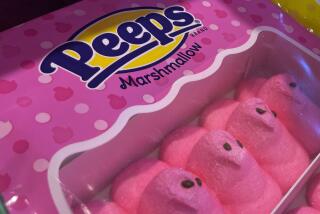Toy sellers raise the bar on safety
NEW YORK â After facing recall after recall of millions of Chinese-made items, the nationâs biggest toy sellers are imposing stricter measures on their suppliers -- including tougher standards for lead content -- to get ahead of expected new federal legislation.
Wal-Mart Stores Inc. and Toys R Us Inc., the nationâs top two toy sellers, are setting a much tighter standard for the amount of lead allowed on surface paint for toys shipped to their chains starting March 1. The companies are also phasing out chemicals found in vinyl products that have raised safety concerns for children.
The measures are meant to meet or exceed new federal standards expected from Congress in the wake of last yearâs highly publicized recalls of millions of toys because they contained excessive amounts of lead or other hazards.
âWe made a commitment to the world that we would push forward toy safety as a top priority,â said Gerald L. Storch, chairman and chief executive of Toys R Us, which announced the measures Friday. âThis is not the last improvement that we will put in place.â
Laura Phillips, vice president and chief toy officer for Wal-Mart, noted that the company was âin the season of writing ordersâ and needed to make the appropriate changes.
The moves come as the industry gears up for the annual American International Toy Fair, which begins Sunday. Although stores say that parentsâ anxiety about toy safety has subsided, retailers and toy makers canât afford another major recall and said they needed to be extra vigilant.
Target Corp., the nationâs No. 2 discounter, said it was working with its âvendors, industry leaders and the Consumer Product Safety Commission,â but did not give specifics.
Ed Schmults, chief executive of FAO Schwarz, said Friday that the upscale toy merchant was demanding that suppliers meet more stringent requirements but would not offer details.
The toy industry has a lot at stake. A challenging economy and the fallout from the recalls hurt toy sales last year. Market research firm NPD Group Inc. said traditional toy sales fell 2% to $22.1 billion in 2007 from a year earlier, and 5% in the October to December period.
Sean McGowan, a retail analyst at Needham & Co., said he expected industry sales this year to be at best unchanged as toy retailers faced an overall slowdown in consumer spending.
A top priority is dramatically reducing the lead content in toys because lead can be toxic if children ingest it. The current federal standard is 600 parts per million in surface coatings, but new legislation being considered would dramatically lower that to 90 ppm.
Both Wal-Mart and Toys R Us are requiring their suppliers to conform to the 90-ppm standard.
Meanwhile, Toys R Us is requiring materials inside the toys to meet a standard of 250 ppm for lead for all products made exclusively for the retailer, compared with the current standard of 600 ppm.
Wal-Mart spokeswoman Melissa OâBrien said the company had not set a deadline for suppliers on that issue but was encouraging them to cut back given legislation pending in Congress on lead content.
Another issue is phthalates, chemicals that are used to soften PVC, or polyvinyl chloride.
Toys R Us said it had notified suppliers that by the end of this year, all childrenâs and baby products sold in its stores must be produced without any phthalates. The goal is to eliminate these chemicals in its products, either by using another ingredient to soften vinyl or eliminating vinyl completely.
Wal-Mart is requiring suppliers to reduce the amount of phthalates to 0.1% in its products, beginning in August. Those standards are in line with rules being enacted in California, while the new federal legislation on the table does not address phthalates.
Toys R Us also hopes to eliminate nickel-cadmium batteries from its products by the end of the year in a move meant to help the environment. The company has instructed its suppliers to immediately take steps to abolish the use of such batteries in all items made for the retailer.
Products that are shipped starting March 1 will also be coded with the manufacturing date, to help identify toys that have been recalled. Both Toys R Us and Wal-Mart are also requiring suppliers to have independent labs test their toys more frequently.
OâBrien said Wal-Mart had no announcement on the nickel-cadmium issue but was encouraging its suppliers to stamp date codes on their products.
More to Read
Inside the business of entertainment
The Wide Shot brings you news, analysis and insights on everything from streaming wars to production â and what it all means for the future.
You may occasionally receive promotional content from the Los Angeles Times.








